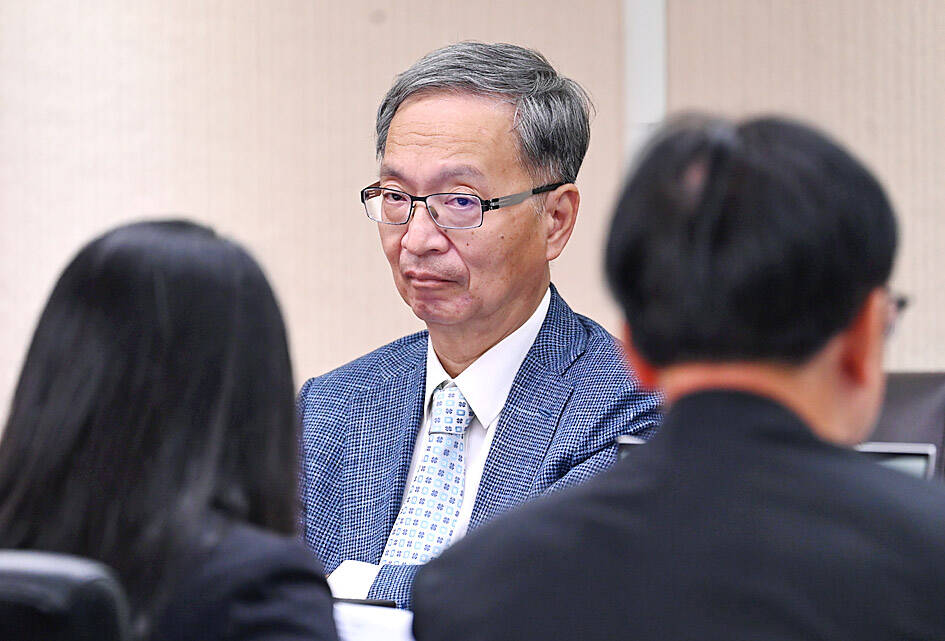With healthcare providers calling for a bill to guarantee the value of each National Health Insurance (NHI) point is at least NT$1, Minister of Health and Welfare Hsueh Jui-yuan (薛瑞元) yesterday said it might harm the NHI’s global budget payment system and should be further deliberated.
Chinese Nationalist Party (KMT) Legislator Su Ching-chuan (蘇清泉) and several other KMT legislators have proposed amending Article 62 of the National Health Insurance Act (全民健康保險法), adding a clause that says “when the [NHI] point value is less than NT$1, the government should supplement it to NT$1,” ensuring that a point equals at least NT$1.
The draft bill is scheduled to be reviewed today by the legislature’s Social Welfare and Environmental Hygiene Committee.

Photo: Liu Hsin-de, Taipei Times
Eight healthcare providers’ associations issued a statement on Tuesday expressing their support for the bill proposed by Su.
The statement said the current NHI global budget payment system forces healthcare facilities to bear the pressure of rising health insurance costs, so although the public is very satisfied with low medical costs, healthcare facilities are struggling to survive.
The NHI’s global budget payment system is an “expenditure cap” system with “floating” point values, used to precisely match the predetermined budget, as the total expenditure claimed by healthcare facilities for their services is reimbursed based on an adjusted amount — multiplied by the point value.
The non-fixed “floating” point value is retrospectively determined every three months after hospital claims are reviewed and it is negatively correlated with nationwide healthcare service volume, so a higher overall service volume leads to lower point value, as well as a lower payment for each service.
The statement said the point value had dropped to as low as between 0.6 and 0.8, which causes unreasonable payments to healthcare providers and is collapsing the NHI system.
Healthcare facilities are not like private businesses as hospitals only receive about 80 percent of NHI income and their medical fee standards are controlled by the health authorities, as well as the NHI global budget payment system’s predetermined “expenditure cap,” so they cannot increase charges or transfer the additional costs to patients, it said.
Facing rising costs and inflation, many healthcare providers are leaving their jobs due to lower salaries and many medical students are unwilling to take positions in departments with more difficult healthcare procedures, it added.
The statement said the law should be amended and the NHI’s global budget payment system changed from a “expenditure cap” system to a “expenditure target” system, meaning that when the point value is less than NT$1, the government should make up the deficit for sustainable development of the healthcare system.
The healthcare providers’ associations included the Taiwan Hospital Association, the Taiwan Medical Center Association, the Taiwan Regional Hospital Association, the Taiwan Community Hospital Association, the Taiwan Medical Association, the Taiwan Union of Nurses Association, the Taiwan Nongovernmental Hospitals and Clinics Association and the Taiwan College of Healthcare Executives.
Hsueh yesterday said that the bill might harm the NHI’s global budget payment system and the issue is unlikely to be adequately solved by only revising an article of the act, so it should be further deliberated.

Palauan President Surangel Whipps Jr arrived in Taiwan last night to kick off his first visit to the country since beginning his second term earlier this year. After arriving at Taoyuan International Airport at around 6:30 pm, Whipps and his delegation were welcomed by Minister of Foreign Affairs Lin Chia-lung (林佳龍). Speaking to gathered media, the Palauan leader said he was excited and honored to be back in Taiwan on his first state visit to Taiwan since he was sworn in this January. Among those traveling with Whipps is Minister of State Gustav N. Aitaro, Public Infrastructure

President William Lai (賴清德) yesterday thanked Palau for its continued support of Taiwan's international participation, as Taipei was once again excluded from the World Health Assembly (WHA) currently taking place in Switzerland. "Palau has never stopped voicing support for Taiwan" in the UN General Assembly, the WHO and other UN-affiliated agencies, Lai said during a bilateral meeting with visiting Palau President Surangel Whipps Jr. "We have been profoundly touched by these endorsements," Lai said, praising the Pacific island nation's firm support as "courageous." Lai's remarks came as Taiwan was excluded for the ninth consecutive year from the WHA, which is being held in

RESOLUTIONS DEBATE: Taiwan’s allies said that UN and WHA resolutions cited by China and other nations ‘do not determine Taiwan’s participation in WHO activities’ A proposal to invite Taiwan to this year’s World Health Assembly (WHA) was rejected on Monday, resulting in Taipei’s absence from the annual meeting for a ninth consecutive year, although partners spoke up for Taiwan’s participation at the first day of the meeting. The first agenda item after the opening was a “two-on-two debate” on a proposal to invite Taiwan to participate at the WHA as an observer. Similar to previous years, two countries made statements in favor of the proposal, while two others expressed their opposition. Philippine Secretary of Health Teodoro Herbosa, president of the 78th WHA, accepted the WHA General Committee’s

At least three people died and more than a dozen were injured yesterday afternoon when a vehicle struck a group of pedestrians in New Taipei City’s Sansia District (三峽). The incident happened at about 4pm when a car rammed into pedestrians at an intersection near Bei Da Elementary School. Witnesses said the sedan, being driven at a high speed, ran a red light, knocking scooters out of the way and hitting students crossing the road before careening into a median near the intersection of Guocheng and Guoguang streets. The incident resulted in three deaths and 13 injuries, including the driver, a 78-year-old man